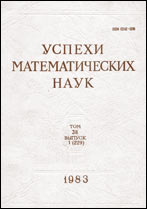|
This article is cited in 26 scientific papers (total in 27 papers)
The initial and final behaviour of trajectories of Markov processes
E. B. Dynkin
Abstract:
The initial and final behaviour of the trajectories of Markov processes is studied within the theory of Martin boundaries. We propose a simpler approach, based on a direct investigation of the class $\mathscr{K}$ of Markov processes with a given transition function and the class $\mathscr{K}^*$ of Markov processes with a given cotransition function. In the class $\mathscr{K}$ ($\mathscr{K}^*$) processes with the following property are distinguished: the probability of any event, determined by an arbitrarily small initial (final) section of a trajectory, is equal to 0 or 1. Every process of $\mathscr{K}$ ($\mathscr{K}^*$) decomposes uniquely into such “ergodic” processes, and the corresponding measure completely describes the initial (final) behaviour of trajectories. The theory is invariant with respect to reversal of time.
Based on the results of the present paper we shall study in a subsequent publication the excessive measures and excessive functions associated with a Markov process.
A brief account of the main ideas of this work (for processes with non-random births and deaths) was given in the author's invited address at the International Congress of Mathematicians in Nice (1970).
Received: 26.02.1971
Citation:
E. B. Dynkin, “The initial and final behaviour of trajectories of Markov processes”, Russian Math. Surveys, 26:4 (1971), 165–185
Linking options:
https://www.mathnet.ru/eng/rm5230https://doi.org/10.1070/RM1971v026n04ABEH003981 https://www.mathnet.ru/eng/rm/v26/i4/p153
|


| Statistics & downloads: |
| Abstract page: | 789 | | Russian version PDF: | 190 | | English version PDF: | 32 | | References: | 104 | | First page: | 3 |
|




 Contact us:
Contact us: Terms of Use
Terms of Use
 Registration to the website
Registration to the website Logotypes
Logotypes








 Citation in format
Citation in format 
